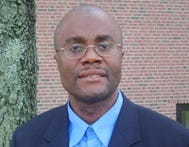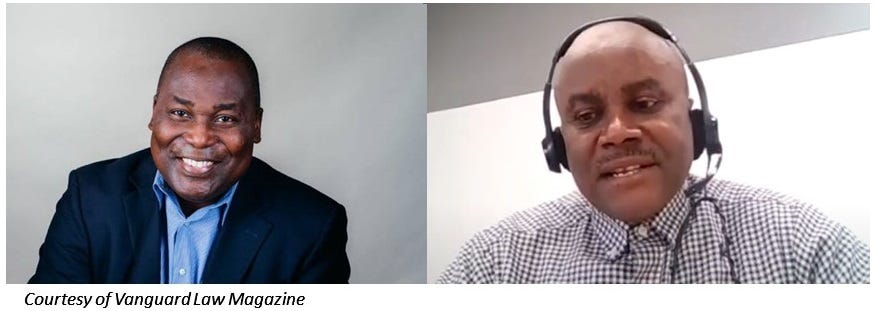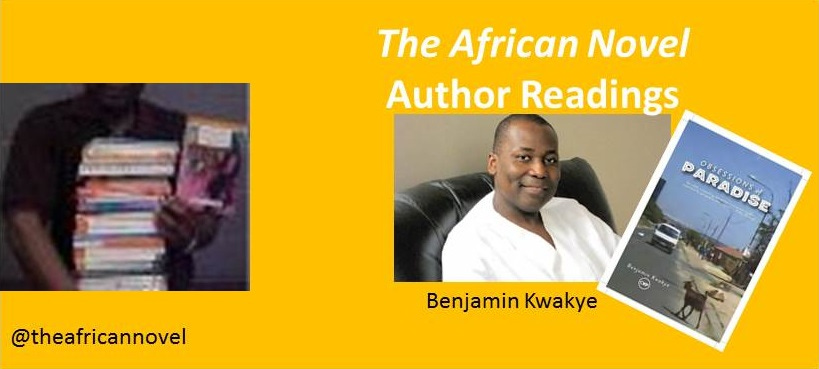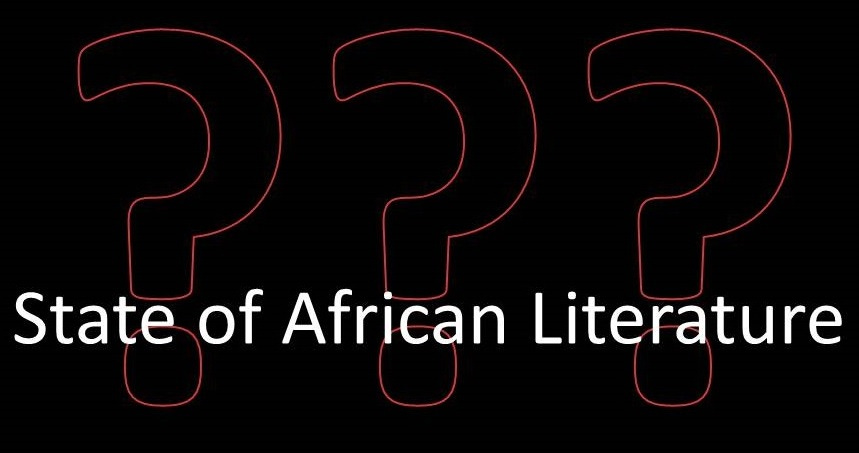Welcome to the latest issue of The African Novel digital newsletter. You have joined an exciting global community of publishers, authors, readers, writers, poets, and performers, as well as academics, missionaries, and even current and former Peace Corps volunteers. We are all connected in our passion for appreciating, celebrating, and sharing African literature and performance in its many forms.
To savor this e-newsletter, we’d highly recommend you patiently read from top to bottom!
Thanks for reading The African Novel! Subscribe for free to receive new posts.
IN THIS ISSUE
Editor-in-Chief's Message
Book Review: Elobi
The African Novel Podcast: Novelist Benjamin Kwakye
Author Readings: Benjamin Kwakye
State of African Literature
Bookshelf
Book Events & More
Our Radio Archives
African Proverb: Kenyan
Editor-in-Chief’s Message
Your Support Will Lift Us Higher
First, Happy Black History Month to you, wherever you are around the globe. Learn a historical fact today in celebration of this special month!
“Many writers don’t like to ask people if they would be willing to pay for their work, even if they very much appreciate knowing,” writes Hamish McKenzie in a Jan. 31 blog titled, “Introducing Substack Pledges.”
“Pledging takes the asking out of it.”
Two pledges The African Novel digital newsletter garnered in January — unsolicited, coupled with the persuasive message of McKenzie’s blog have led me to write this column in this issue. Two reader pledges did exactly what pledges are designed to do, according to McKenzie.
“Pledges give readers the power to proactively express their love and support for writers,” McKenzie writes. I cannot tell you how exhilarating it was to receive email notifications of the pledges — a demonstration that we are producing something our readers find valuable.
I immediately wrote our team to share the good news. “A reader has put a cash value to the product we publish every month as a way to encourage us,” I wrote, after reading the first email.
My internal communication went on to say: “I hope we can all feel proud of this form of compliment to The African Novel digital newsletter and to the team that puts it out.”
Beginning with this issue, we are unapologetically providing our readers an opportunity to pledge funds to support our literary reporting here on the Substack platform. Substack, a highly respected platform, has all the necessary guardrails in place to protect your privacy. Funds are paid out later to the blogging entity (like us) on Substack.
You may support — voluntarily — at a monthly or yearly level, or at a “founding member” level, in the example of our two readers who pledged last month.
Note that come April, access to certain content of the The African Novel newsletter may be restricted by a paid subscription paywall.
Thank you for your support! It lifts us higher!
Enjoy!
Cyril Ibe, Ph.D.
P.S. Perhaps a friend forwarded this email to you. Sign up now to receive The African Novel directly in your inbox.
Please share the enjoyment of reading The African Novel digital newsletter with a friend, family member, or colleague.
Title: Elobi
Author: Patrice Nganang
Publisher: Africa World Press
Reviewer: Peter Vakunta, Ph.D.
By titling his poem of lamentation Elobi, Nganang makes a declaration as rich and complex as it is varied in its implications. Elobi is not only a neighborhood in Cameroon’s capital city of Yaoundé; it is also the personification of abject poverty in the midst of abundance. Elobi is the specifically Cameroonian way of referring to the wet, swampy areas that surround riverbanks. Elobi is a designation of where the slums are, and where the poor masses live.
Against this backdrop, it is not surprising then that Nganang’s poem touches on virtually every aspect of the decadent polity code-named Cameroon. Yaoundé, however, is only the runway from which the poet's imaginative flight takes off. Before long, he is briefly reviewing Cameroon as a geographical expression, a nation-state, albeit in a shambles which he christens “the republic of clowns.”
Nganang’s immediate concern is to delineate the dichotomy between the silence of speech and the speech of silence. This antithetical parallelism is not used fortuitously as it prefigures the poet’s bull’s eye, namely the macabre silence that engenders the illusion of freedom in a world where speaking truth to power is anathema.
Thus, Nganang’s Elobi is the poetization of a political archetype where modern “judas…usher in the silence of slow death.” By this token, Elobi is the poet’s attempt to underscore the ramifications of lexical hollowness. As he puts it, “…my words have lost the meanings of their definition.”
Elobi is an eerie poem wherein scatology thrives and serves as a lethal weapon of combat in the hands of a disenchanted son of the soil who recalls his childhood with melancholy and dystopia. Scatology is ubiquitous in Elobi, the more so because it serves as a motif for the moral decadence that characterizes the wheeling and dealing orchestrated by the ruling class, political nitwits whose stock-in-trade is to serve as stimuli for “the confirmation of eternal damnation.”
To convey his nagging and ever-present disturbingly tragic message, Nganang addresses and faults the Cameroonian society as a whole, from the wolowoss (whores) to political party leaders. This is the stock in trade of a poet overwhelmed by the man-made problems besieging his fatherland: from the lack of potable water in parts of Cameroon, to fraud committed by the head of state.
Editor’s Note: Reviewer Professor Peter Wuteh Vakunta teaches at the United States Department of Defense Language Institute in Monterey, California.
Episode #11
Ghanaian-born novelist and poet Benjamin Kwakye talks with Cyril Ibe about his works and the moniker, “resident novelist,” for which he has been known since his first novel, The Clothes of Nakedness, was published in 1998.
Past Podcast Episodes:
Gambian poet Tijan Sallah (Parts 1 & 2), author of I Come from a Country
Poet Obiwu Iwuanyanwu, author of Tigress at Full Moon
Harlem-based writer Obi Nwizu, author of Residue
Jeanne-Marie Jackson, author of The African Novel of Ideas
Patricia Jabbeh Wesley, author of Praise Song for My Children
Bayadir Mohamed-Osman, author of Second Hand Smoke
Vanessa Onwuemezi, author of Dark Neighbourhood
Cyprian Njoku Josson, author of The Immigrant Ladder
Kabuika Kamunga, author of Kabuika Wants to Make New Friends
Author Readings
Hear authors themselves reading from their works.
The African Novel's “resident novelist” Benjamin Kwakye reads from Obsessions of Paradise, one of several books published after his debut novel, The Clothes of Nakedness (Heinemann, 1998).
Questions on the State of African Literature
Three questions are posed to writers every month. Listen here to their answers.
Responding to the questions below is writer Obi Nwizu.
Are writers of African fiction “taking the literary world by storm?” these days?
Is the “tide turning” for African literature in America and the rest of the West?
Are we witnessing “a renaissance” of African literature today?
Bookshelf
What writers and readers of African titles are reading:
Young writer Adaobi Iwuanyanwu:
The Song of Achilles by Madeline Miller
I Fell in Love with Hope by Lancali
Night and Day by Virginia Woolf
The Great Gatsby by F. Scott Fitzgerald
If We Were Villains by M.L. Rio
It Ends With Us by Colleen Hoover
Where the Crawdads Sing by Delia Owens
Poet Tijan Sallah from the Gambia: African Literature and the CIA: Networks of Authorship and Publishing by Caroline Davies; Ancient Ghana and Mali by Nehemiah Levtzion; Nonrequired Reading by Wislawa Szymborska; African Literature Comes of Age, African Literature Today 40, edited by Ernest Emenyonu.
Comparative literature professor Jeanne-Marie Jackson (Baltimore, Maryland): Brotherhood by Mohamed Mbougar Sarr (in English translation; French original); The Wolf at Number 4 by Ayo Tamakloe-Garr; The Madhouse by T.J. Benson; and An Unusual Grief by Yewande Omotoso (just started reading).
Poet Obiwu (Ohio, USA): The Girl with the Louding Voice by Abi Dare; Ijele by Uche Nduka; Samarkand by Wole Soyinka; Ingrid Joker: Poet Under Apartheid by Louise Viljoen.
Writer Arinze Ifeakandu: Hue and Cry by James Alan McPherson, and The Great Mistake by Jonathan Lee.
Writer Obi Nwizu (New York): Another Country by James Baldwin and The Girl With the Louding Voice by Abi Dare.
Poet Bayadir Mohamed-Osman (Maryland): Pathologies of Power: Health, Human Rights, and The New War on the Poor by Dr. Paul Farmer; Secrets of Divine Love by A. Helwa.
Writer/Poet Vanessa Onwuemezi (London): The Palmwine Drinkard by Amos Tutola; Lote by Shola Von Reinhold.
Novelist Cyprian Josson (Chartres, France): Ladies Trip by Fanny Enoh; Burning Grass by Cyprian Ekwensi.
Novelist Benjamin Kwakye (Michigan, USA): Chronicles from the Land of the Happiest People on Earth by Wole Soyinka; The Love Songs of W.E.B. Du Bois by Honoree Fanonne Jeffers.
Cyril Ibe (Ohio, USA): Things Fall Apart (in French)/Le Monde s’effondre by Chinua Achebe; Songs of Benjamin by Benjamin Kwakye.
(As a reader or subscriber of this newsletter, you can submit titles of African fiction and other books on your reading list. Tell us in what part of the world you reside).
Book Events & More…
On Demand:
What: Library of Congress’ Interviews with African Writers, a three-part series titled “Conversations with African Poets and Writers Series.” Featured are Nigerian-born author Chimamanda Ngozi Adichie, South African novelist, and playwright Damon Galgut, and Tanzanian-born novelist and Nobel Laureate Abdulrazak Gurnah.
When: Available since May 2022.
Where: Library of Congress
For more information: Visit here.
Our Radio Archives
Coming soon: Offerings of rare, exclusive interviews and audio documentaries for our paid subscribers.
A partial list of archived Premium offerings:
Interview: Chinua Achebe biographer Ezenwa-Ohaeto
Interview: Nobel Laureate Wole Soyinka on his legendary cousin, Fela
Interview: The Black press in America
Interview: South African novelist Mark Mathabani
Audio Documentary: Eighty Gifts for Poet Laureate Gwendolyn Brooks
An audio tour of the Mandela House Museum in Soweto, South Africa
Interview: Ethiopian-Jewish Filmmaker Orly Malessa
Interview: U.S. filmmaker Ileen LeBlanc on Take Us Home, a documentary pic on the exodus of Ethiopian Jews to Israel.
Interview: American historian Edward Haas on slavery, the civil war, and the uncelebrated heroism of Blacks in the Union Army.
Interview: Herbert Martin, professor emeritus of English literature and African-American studies at the University of Dayton and co-editor of The Collected Novels of Paul Laurence Dunbar (Ohio University Press).
Thanks for reading The African Novel! Subscribe for free to receive new posts and support our work.
Subscribed
African Proverb
"A fully grown up tree cannot be bent into a walking stick.” — Kenyan proverb.
Our Team
Cyril Ibe, Ph.D., Editor-in-Chief (Ohio)
Resident Novelist/Reviewer Benjamin Kwakye (Michigan)
Nollywood Director/Filmmaker/Novelist Cyprian Josson (Chartres, France)
Contributor/Writer Kabuika Kamunga (Rochester, Minnesota)
Past Issues of The African Novel eNewsletter:
Issue #4










